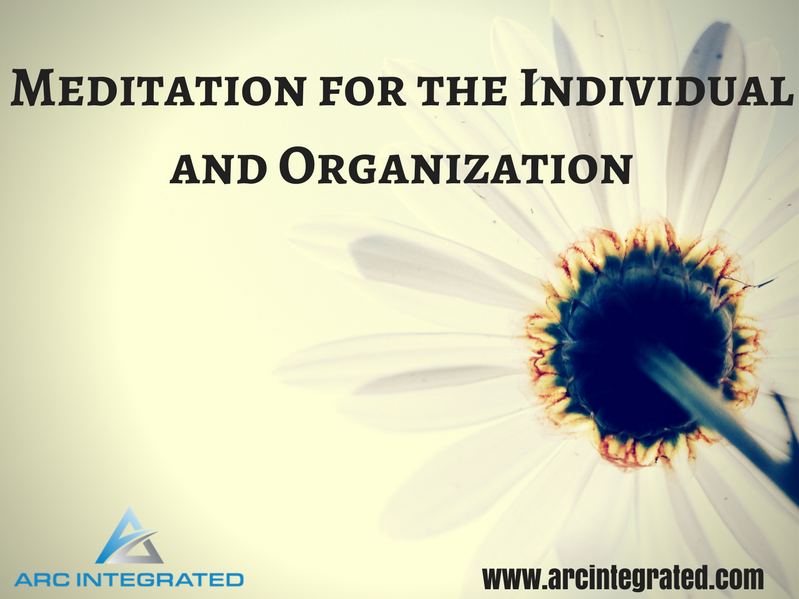
Meditation for the Individual and Organization – Arc Integrated
I have been meditating for some time. I have experienced a wide variety of meditation practices. Practices ranging from breathing exercises to guided meditation to qi gong, a Chinese based practice of held posture or soft movements related to energy cultivation. All of these have found to be valuable in particular ways. Mostly I practice Chi Kung in addition to daily seated meditation. See the link to learn more about my daily practice. However, this post is not about my daily practice. It’s about why meditation for the individual and organization are both so important.
Recently I came across a device call MUSE: The Brain Sensing Headband™ (affiliate link). The device is a headband that gives immediate feedback on brain activity through a synced app on your device. For a detailed account of the process see this link.
Basically, this device works through first calibrating your current brain state (different all the time of course) and sets that stage for how active your brain currently is. From there you get to pick the length of meditation, from three minutes to one hour, and a scene (rain forest or beach) that is associated with your meditation session. You get feedback through sound from the scene you choose. For example, crashing waves when active, soft waves when your brain is calm. In addition, you hear birds chirping when your brain is particularly calm.
When the session is over you get a detailed report of your session and how calm or active your brain was. The detailed account is presented in an easy to read graph of the ups and downs of activity during the session.
So the question may still be – what is the point of meditation? It’s a valid question, with many answers! Meditation has been shown to reduce stress, anxiety, depression and even improve productivity. Please see highlights below –
Meditation for the Individual
Meditation can have an impact on the body, mind and overall well-being. Below are just some highlights of the impact of meditation on the individual.
- Impact on Aging – According to a study at UCLA, they concluded that long term meditators had less age related gray matter in the brain.
- Management of Health Conditions – The Mayo Clinic sites meditation as having a high impact on both emotional well-being as well as helping people to manage symptoms of Asthma, High Blood Pressure, Heart Disease and more.
- Impact on Depression, Anxiety and Pain – In a meta-analysis last year at John Hopkins, researchers determined that mindfulness meditation practices had a moderate impact on depression, anxiety and pain. Here is another resource for how meditation can improve happiness.
- Meditation and Self-Control – In a study in 2013 by three universities, it is suggested that meditation training can have an impact on self-control and smoking reduction.
Meditation for the Organization
The impact of meditation on the organization can be significant. Implementing meditation can have an impact on productivity, absenteeism and even the bottom line!
- Impact on Absenteeism – According to an article by The Harvard Business Review – employees struggling with depression lose an average of 27 days of work per year. If we know that meditation can have an impact on depression, then this could be a way to improve absenteeism and ultimately save the company time and money.
- Impact on Disability – The World Health Organization estimates the depression will be the leading cause of disability by 2020 with heart disease as second. This means high cost to companies that don’t find ways to work towards helping employees reduce and manage such issues.
- Impact on Healthcare Costs and Productivity – Corporate mindfulness programs are on the rise. According to an article by The Atlantic, Aetna states that since instituting its mindfulness program it has saved $2000 per employee in healthcare costs and gained $3000 per employee in productivity costs.
- Meditation More Common in the Workplace – According to an article by The Society for Human Resource Management, meditation and mindfulness programs are being implemented into wellness programs more regularly because of the great benefits associated.
So how does all this great data relate back to MUSE™? Well, for a few reasons –
Meditation for the Individual and Organization
- Easy to Understand Feedback – The immediate feedback MUSE™ gives is unique when it comes to meditation. Often times when meditating it is harder to get immediate results, which is why it takes lots of practice. MUSE™ takes practice too, but offers a way to see the direction you are heading.
- Fun in Competition – Meditation is not generally competitive. However, with integration into a company’s wellness program, using MUSE™ in meditation, could be similar to running a challenge of healthy eating, walking or drinking water. For example, a race to get to 75% relaxation or a meditation for 30 days challenge.
- Measurable – For those individuals or organizations that want to see progress in a measurable fashion, MUSE™ could be a tool for this. Gathering data over time allows you to see where you started and how far you’ve come.
- An Introduction to Meditation – If you have never meditated you may have views, opinions or an image in your mind. This device takes some of the mystery out of the practice and allows for a glimpse into what is possible through calming your mind as well as the relationship between your mind and body. Any way to connect our understanding of how our mind impacts other aspects of our health, is a great opportunity for growth and development.
How have you found meditation to be helpful in your life or workplace?
Please share or comment below.
Thanks!
Michael
P.S. If you’re looking for more resources on stress reduction, mindfulness and adaptability, check out my new book – CHANGES – The Busy Professional’s Guide to Reducing Stress, Accomplishing Goals and Mastering Adaptability.

